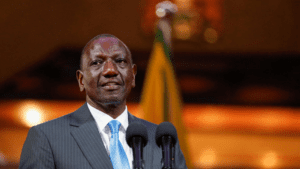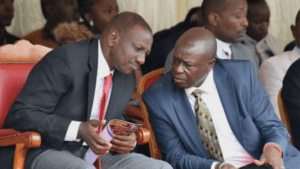
Mutahi Kahiga
- Nyeri Governor Mutahi Kahiga declares unwavering regional support for Rigathi Gachagua in the 2027 elections.
- Strong warning issued against those who might oppose Gachagua, labeling them as traitors.
- Cabinet Secretaries from the region discouraged from returning to Nyeri, with Kahiga urging allegiance to Gachagua.
- Governor Kahiga criticizes political adversaries for targeting Gachagua despite his claimed withdrawal from active politics.
- Gachagua accuses security officials of complicity in a violent attack during a public event, calling it an orchestrated attempt on his life.
- The impeachment of Gachagua polarizes political leaders, igniting debate over President Ruto’s decision.
In a fiery and unwavering display of support, Nyeri Governor Mutahi Kahiga has sent a resounding message to his constituents and political leaders: Rigathi Gachagua’s position in the Mount Kenya region is non-negotiable. Speaking during a Sunday service in Nyeri County, the governor made it clear that any deviation from supporting the impeached Deputy President in the upcoming 2027 general elections would be seen as an act of treachery.
Governor Kahiga’s remarks reflect the high-stakes nature of regional politics and underscore the depth of loyalty Gachagua commands in his home turf. By framing any opposition to Gachagua as a betrayal, Kahiga seeks to solidify the region’s political identity and loyalty under one banner—a move that could have significant ramifications in the national political landscape.
A Warning Against Disloyalty
Governor Kahiga left no room for ambiguity in his message. “We do not want traitors here. If you take another position, you are a traitor. We stand firmly behind Gachagua,” he declared in a mix of Swahili and English. This statement, made in a public and religious setting, highlighted the deeply emotional and cultural ties driving regional support for the embattled leader.
Kahiga further asserted that Gachagua’s leadership and representation were central to the region’s aspirations. His firm stance suggests that the governor is rallying the region’s electorate to close ranks around Gachagua, ensuring a united front in the face of any political challenges.

Targeting Cabinet Secretaries
In a surprising twist, Governor Kahiga took aim at Cabinet Secretaries hailing from the region. He warned those appointed to high-ranking government positions to refrain from returning to Nyeri. According to Kahiga, their roles in the national government do not equate to regional representation and may even be seen as undermining Gachagua’s influence.
“If there is one position meant for Nyeri, it should be that of the Deputy President. We do not need Cabinet Secretaries,” Kahiga stated passionately. “Should we lose the Deputy President and settle for ministers instead?” This sentiment reveals an underlying frustration with what he perceives as an erosion of the region’s political significance.
The Backlash Against Gachagua’s Adversaries
Kahiga also addressed ongoing political animosity directed at Gachagua, criticizing those who continue to attack him despite his claims of stepping back from active politics. He alluded to a recent incident in Limuru where Gachagua and his supporters were reportedly targeted by armed attackers during a public event.
“If you see us being silent, leave us alone. We are following instructions,” Kahiga explained, suggesting that Gachagua’s current approach involves calculated restraint. The governor’s comments highlight the political turbulence surrounding Gachagua, who remains a polarizing figure.
Gachagua Speaks Out on the Limuru Attack
Rigathi Gachagua, for his part, has openly accused state security agencies of orchestrating the attack in Limuru. In an interview, he described the violent disruption as a “well-planned attempt on my life.” He alleged that local security teams were complicit in enabling the chaos, pointing to the withdrawal of his security detail a week prior as evidence of premeditation.
“Police in unmarked vehicles blocked attendees from leaving the event,” Gachagua claimed. He further alleged that senior security officials in Kiambu County held a clandestine meeting at Tigoni Police Station to pave the way for the attack, offering a “safe corridor” to the perpetrators. These accusations have intensified the political drama surrounding Gachagua and his impeachment.
Polarization Following Gachagua’s Impeachment
The impeachment of Rigathi Gachagua has sent shockwaves through Kenya’s political arena. Leaders are now divided into two distinct factions: those who vehemently defend Gachagua and those who support President William Ruto’s decision to impeach him. The rift exposes deeper divisions within the ruling coalition and raises questions about the future of Mount Kenya’s political alignment.
Supporters argue that Gachagua’s leadership symbolizes the region’s political strength and unity, while critics contend that his impeachment was a necessary move to restore stability and accountability. As these debates continue, Governor Kahiga’s staunch defense of Gachagua signals an unyielding commitment to regional solidarity.
The Implications for 2027
Governor Kahiga’s declaration of loyalty to Gachagua and his insistence on regional unity set the stage for a high-stakes political battle in the 2027 general elections. By framing opposition as betrayal, Kahiga is attempting to create a strong psychological barrier against dissent. This strategy, however, could polarize the electorate further, making it difficult for moderates to navigate the political landscape.
Gachagua’s own narrative of victimhood and resilience may resonate with voters who feel alienated or marginalized. His claims of state-sponsored attacks and political persecution paint a picture of a leader under siege, potentially garnering sympathy and galvanizing his base.
A Pivotal Moment for Mount Kenya Politics
The unfolding drama surrounding Rigathi Gachagua’s political career and the unwavering support from leaders like Governor Kahiga highlight the complexity of Kenyan politics. Loyalty, betrayal, and regional pride are all playing critical roles in shaping the narrative.
As the 2027 elections draw closer, the stakes are higher than ever. Will Kahiga’s rallying cry unite the region under Gachagua’s leadership, or will the divisions deepen further? One thing is certain: the battle for Mount Kenya’s political soul is far from over.

